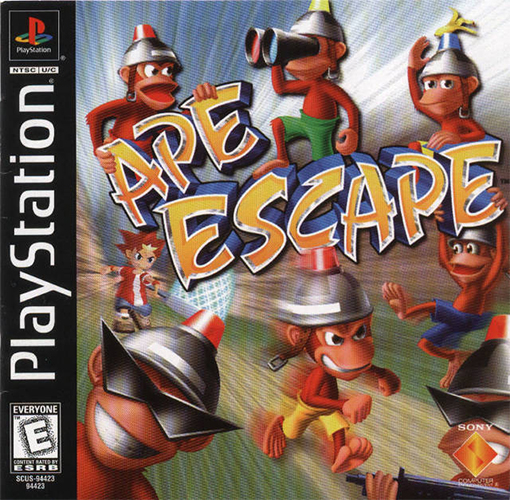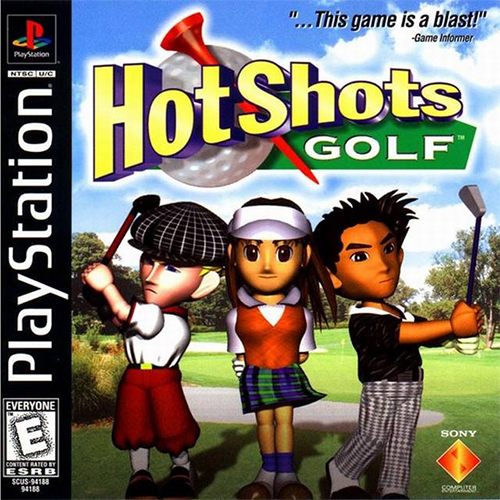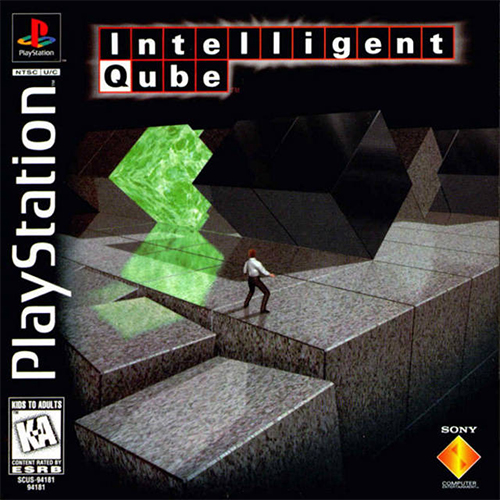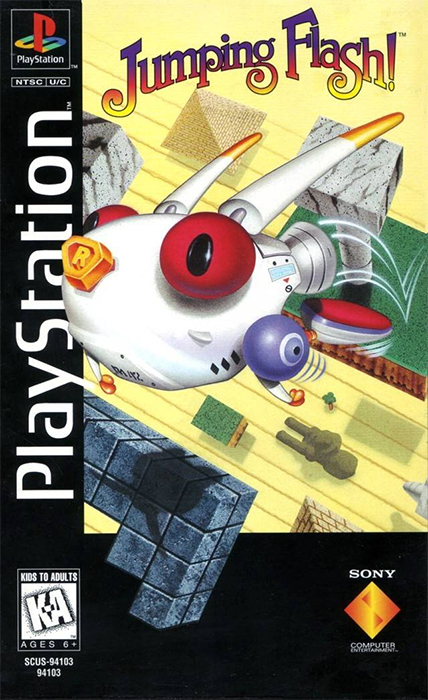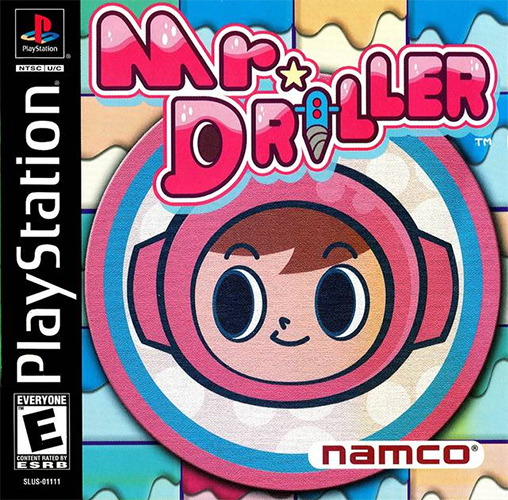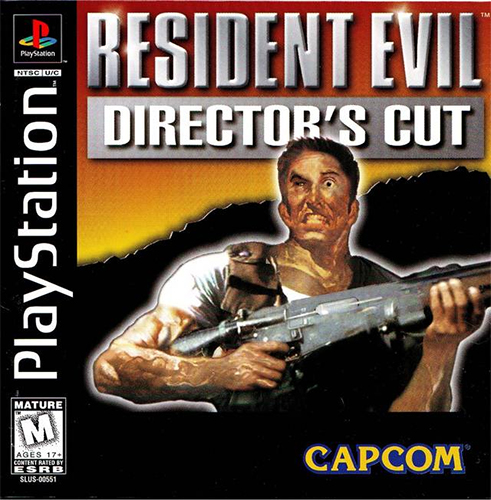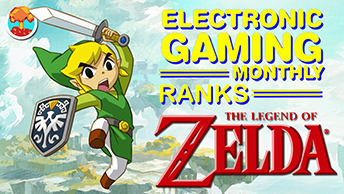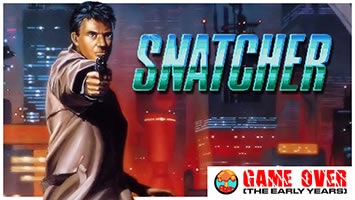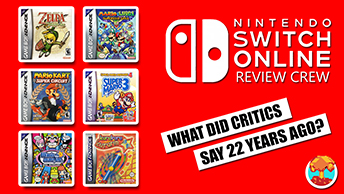- CLASSIC MAGAZINES
- REVIEW CREW
A show recapping what critics thought back
when classic games first came out! - NEXT GENERATION'S BEST & WORST
From the worst 1-star reviews to the best
5-stars can offer, this is Next Generation! - NINTENDO POWER (ARCHIVE)
Experience a variety of shows looking at the
often baffling history of Nintendo Power! - MAGAZINE RETROSPECTIVE
We're looking at the absolutely true history of
some of the most iconic game magazines ever! - SUPER PLAY'S TOP 600
The longest and most ambitious Super NES
countdown on the internet! - THEY SAID WHAT?
Debunking predictions and gossip found
in classic video game magazines! - NEXT GENERATION UNCOVERED
Cyril is back in this spin-off series, featuring the
cover critic review the art of Next Generation! - HARDCORE GAMER MAGAZING (PDF ISSUES)
Download all 36 issues of Hardcore Gamer
Magazine and relive the fun in PDF form!
- REVIEW CREW
- ELECTRONIC GAMING MONTHLY
- ELECTRONIC GAMING MONTHLY RANKS
From Mario to Sonic to Street Fighter, EGM
ranks classic game franchises and consoles! - ELECTRONIC GAMING MONTHLY BEST & WORST
Counting down EGM’s best and worst reviews
going year by year, from 1989 – 2009! - ELECTRONIC GAMING BEST & WORST AWARDS
11-part video series chronicling the ups and
downs of EGM’s Best & Worst Awards!
- ELECTRONIC GAMING MONTHLY RANKS
- GAME HISTORY
- GAME OVER: STORY BREAKDOWNS
Long-running series breaking down game
stories and analyzing their endings! - A BRIEF HISTORY OF GAMING w/ [NAME HERE]
Real history presented in a fun and pithy
format from a variety of game historians! - THE BLACK SHEEP
A series looking back at the black sheep
entries in popular game franchises! - INSTANT EXPERT
Everything you could possibly want to know
about a wide variety of gaming topics! - FREEZE FRAME
When something familiar happens in the games
industry, we're there to take a picture! - I'VE GOT YOUR NUMBER
Learn real video game history through a series
of number-themed episodes, starting at zero! - GREAT MOMENTS IN BAD ACTING
A joyous celebration of some of gaming's
absolute worst voice acting!
- GAME OVER: STORY BREAKDOWNS
- POPULAR SHOWS
- DG NEWS w/ LORNE RISELEY
Newsman Lorne Riseley hosts a regular
series looking at the hottest gaming news! - REVIEW REWIND
Cyril replays a game he reviewed 10+ years
ago to see if he got it right or wrong! - ON-RUNNING FEUDS
Defunct Games' longest-running show, with
editorials, observations and other fun oddities! - DEFUNCT GAMES QUIZ (ARCHIVE)
From online quizzes to game shows, we're
putting your video game knowledge to the test!- QUIZ: ONLINE PASS
Take a weekly quiz to see how well you know
the news and current gaming events! - QUIZ: KNOW THE GAME
One-on-one quiz show where contestants
find out if they actually know classic games! - QUIZ: THE LEADERBOARD
Can you guess the game based on the classic
review? Find out with The Leaderboard!
- QUIZ: ONLINE PASS
- DEFUNCT GAMES VS.
Cyril and the Defunct Games staff isn't afraid
to choose their favorite games and more! - CYRIL READS WORLDS OF POWER
Defunct Games recreates classic game
novelizations through the audio book format!
- DG NEWS w/ LORNE RISELEY
- COMEDY
- GAME EXPECTANCY
How long will your favorite hero live? We crunch
the numbers in this series about dying! - VIDEO GAME ADVICE
Famous game characters answer real personal
advice questions with a humorous slant! - FAKE GAMES: GUERILLA SCRAPBOOK
A long-running series about fake games and
the people who love them (covers included)! - WORST GAME EVER
A contest that attempts to create the worst
video game ever made, complete with covers! - LEVEL 1 STORIES
Literature based on the first stages of some
of your favorite classic video games! - THE COVER CRITIC
One of Defunct Games' earliest shows, Cover
Critic digs up some of the worst box art ever! - COMMERCIAL BREAK
Take a trip through some of the best and
worst video game advertisements of all time! - COMIC BOOK MODS
You've never seen comics like this before.
A curious mix of rewritten video game comics!
- GAME EXPECTANCY
- SERIES ARCHIVE
- NINTENDO SWITCH ONLINE ARCHIVE
A regularly-updated list of every Nintendo
Switch Online release, plus links to review! - PLAYSTATION PLUS CLASSIC ARCHIVE
A comprehensive list of every PlayStation
Plus classic release, including links! - RETRO-BIT PUBLISHING ARCHIVE
A regularly-updated list of every Retro-Bit
game released! - REVIEW MARATHONS w/ ADAM WALLACE
Join critic Adam Wallace as he takes us on a
classic review marathon with different themes!- DEFUNCT GAMES GOLF CLUB
Adam Wallace takes to the links to slice his way
through 72 classic golf game reviews! - 007 IN PIXELS
Adam Wallace takes on the world's greatest spy
as he reviews 15 weeks of James Bond games! - A SALUTE TO VAMPIRES
Adam Wallace is sinking his teeth into a series
covering Castlevania, BloodRayne and more! - CAPCOM'S CURSE
Adam Wallace is celebrating 13 days of Halloween
with a line-up of Capcom's scariest games! - THE FALL OF SUPERMAN
Adam Wallace is a man of steel for playing
some of the absolute worst Superman games! - THE 31 GAMES OF HALLOWEEN
Adam Wallace spends every day of October afraid
as he reviews some of the scariest games ever! - 12 WEEKS OF STAR TREK
Adam Wallace boldly goes where no critic has
gone before in this Star Trek marathon!
- DEFUNCT GAMES GOLF CLUB
- DAYS OF CHRISTMAS (ARCHIVE)
Annual holiday series with themed-episodes
that date all the way back to 2001!- 2015: 30 Ridiculous Retro Rumors
- 2014: 29 Magazines of Christmas
- 2013: 29 Questionable Power-Ups of Christmas
- 2012: 34 Theme Songs of Christmas
- 2011: 32 Game Endings of Christmas
- 2010: 31 Bonus Levels of Christmas
- 2009: 30 Genres of Christmas
- 2008: 29 Controls of Christmas
- 2007: 34 Cliches of Christmas
- 2006: 33 Consoles of Christmas
- 2005: 32 Articles of Christmas
- 2004: 31 Websites of Christmas
- 2003: 29 Issues of Christmas
- 2002: 28 Years of Christmas
- 2001: 33 Days of Christmas
- NINTENDO SWITCH ONLINE ARCHIVE
- REVIEW ARCHIVE
- FULL ARCHIVE
PlayStation Plus: 1990s Critics Review Ape Escape, Resident Evil, Jumping Flash & More
After months of hype and speculation, Sony has finally released a number of new tiers for their popular PS+ subscription service. Now, you'll have access to a wide assortment of PS4 and PS5 games, similar to what Microsoft has been doing with GamePass, but that's not all. If you subscribe to either the Deluxe or Premium tiers, you'll have access to a bunch of classic games released for the PlayStation, PlayStation 2 and PlayStation Portable. And that's where we step in.
As of launch week, there are currently thirteen games available that came from the original PlayStation. Those include a smattering of big names and cult classics, along with a number of franchises Sony unceremoniously dropped a long time ago, much to the frustration of the fans. In order to see if any of these games are worth playing, I'm going to flip through the pages of classic magazines like Electronic Gaming Monthly, Ultra Game Players, PSM and more to see what critics said when these games first came out. Join me for the first part in this two-day premiere of the PlayStation Plus Review Crew.
History remembers Ape Escape as one of the cartoony platformers Sony abandoned after running it into the ground, but this game was a big deal when it was first released in 1999. More than anything else, this was the showpiece game for Sony's DualShock controller, which meant that it was the first game you couldn't play with the standard game pad that came with early PlayStation units. The gamble paid off, and Ape Escape proved to be a big hit with not only gamers, but also critics.
Electronic Gaming Monthly ended up giving it their Game of the Month prize, with John D. praising the game for being “something genuinely unique and original for a platformer. If you can tolerate the crap music and cutesy look, Ape Escape is definitely worth a look." Crispin summed it up this way: “From its oddball story to its ridiculous sound effects, Ape Escape is a big bundle of wackiness – extremely innovative wackiness.”
Next Generation was even more enthusiastic about the game, raving that it was one of the best games of the year. “Frankly, we couldn't stop playing. Ape Escape manages to appeal to a very broad range of players. It's general light-hearted cuteness makes it ideal for younger players, but its originality and challenge will also appeal to the most jaded hardcore players. A terrific game.”
You saw a similar score coming from PSM, who gave the game a perfect 5 out of 5. Computers and Video Games also loved the game and gave it a 4 out of 5. Believe it or not, it was Game Fan who ended up giving Ape Escape the lowest scores. Critic ECM went as low as to give the game a 60%, arguing that he could “call this game ill-conceived, uninspired and downright boring, I'll simply call it Blasto 2: The Next Generation, and leave it at that.” Don't let that questionable take turn you off of Ape Escape, because the rest of the critics were right. This was an innovative game with a ton of charm, and if you've never played the original Ape Escape, now is the perfect time to catch the fun.
While Electronic Arts continued to perfect the golf simulator with their Tiger Woods franchise, Sony decided to go a completely different direction. I don't care if you call it Hot Shots Golf or Everybody's Golf, because this 1998 classic from Camelot is a legitimate hit with cartoony graphics, colorful courses and charismatic characters. The game proved to be so much fun that it would spawn six sequels, a VR version and even a tennis spin-off.
It's fun to see that charm rub off on the critics, who simply couldn't resist this game. Electronic Gaming Monthly's Sushi-X posed this question: “Hate golf games? Well, maybe you just haven't met the right one yet. Hot Shots Golf is seamless, fast-paced golf tempered with great gameplay and a light-hearted approach that makes the game surprisingly enjoyable.” Shawn agreed, though gave the game a slightly lower score: “Hot Shots provides hours of fun play, but mastering your short game and avoiding shanking may be tricky. It seems all too easy to be slightly off on the gauge and end up in a sand trap or lake.”
Computer and Video Games weren't nearly as impressed, giving the game a 3 out of 5. Their complaint seems fairly obvious: “If you buy Hot Shots Golf expecting some PGA simulation, after a couple of days' play, it will end up gathering dust. Although this is a simple game to just pick up and play, there is no real sense of enjoyment in sitting through tournament after tournament trying to get the hidden courses up. It feels like robot golf. Swing, hit, chip, putt and repeat until finished.”
Next Generation was much kinder to this first Hot Shots game. “While American sports developers and publishers have been busy coming up with enough cash to buy the Tiger Woods license, Sony of Japan has managed to create the first golf game since the early PGA Tour Golfs that is actually fun.” They did argue that the “big-headed golfers and secret characters seem to be geared to appeal to fighting game fans and are likely to turn off any real golf aficionados,” but still found the game fun and gave it 4 out of 5 stars. That seems like a fair score, because even if it doesn't have the bells and whistles of later installments, this first Hot Shots Golf is still a lot of fun.
After a whole generation of blocks dropping from the sky, I.Q.: Intelligent Qube marked a nice change of pace for the puzzle genre. Using the new technology to create concepts that were otherwise unheard of on 16-bit platforms, this 1997 cult classic quickly became a hit amongst those lucky enough to be in the know. And while the reviews were a little mixed, pretty much everybody agreed that this was a puzzle game worth paying attention to.
Over at Electronic Gaming Monthly, John was Intelligent Qube's biggest cheerleader, calling it a “refreshingly unique puzzle game that is both highly addictive and a nice change of pace from all the me-too block droppers that have been flooding the market lately.” HG also liked that there were no falling pieces, though noted that “visually, the 3D doesn't look too hot, but it does what it was intended to. A two-player simultaneous mode would have been welcomed, but this is more about challenging each individual.”
Elsewhere, we saw Edge give Intelligent Qube a so-so 7 out of 10, which is on par with the 3.5 out of 5 we saw from PSM. Of all the magazines, it was Die Hard Game Fan who was most impressed with this 32-bit puzzler. The Enquirer gave it an 88% and called it the “best new puzzle game that has been released in many years. The control is a little awkward, but once mastered, IQ is really addictive. The music is really amazing in terms of quality and originality, and the levels are some of the hardest 3D puzzle levels ever.” It may not be as flashy as other PS+ games available, but most critics agree that you should give it a look.
Before Super Mario 64 or Crash Bandicoot, there was Jumping Flash, the world's first 3D platformer. Starring a giant mechanic rabbit going up against a Hawaiian-themed villain, it was clear from the jump that this wasn't going to be your typical action game. And jump is clearly the right word, because our robot hero can jump over skyscrapers in a single bound. While the franchise sadly fizzled out over time, Jumping Flash will always be remembered as a giant leap forward for the platformer genre.
Electronic Gaming Monthly seemed genuinely shocked that Jumping Flash turned out so well. Scott gave it a 9 and said, “A giant mechanical rabbit-type substance? Who couldn't fall instantly in love with Jumping Flash? Precise control and fast-changing, top-down views let JF reach unprecedented heights.” Mike also liked the game, but issued a warning: “Those who have motion sickness beware. First, let me start by saying this has got to be one of the weirdest games I have seen or played in a long time. The best part of this game is the fact that anyone will be able to pick it up, play it and have tons of fun.”
GamePro also liked the game, giving it a 4 out of 5. Much like Mike, they issued their own warning: “Don't be put off by the juvenile concept of this game – controlling a cybernetic rabbit in a hostile virtual world could translate into the sleeper game of the year.” Die Hard Game Fan agreed, concluding that “Jumping Flash will go down in history as one of the most monumentally innovative games of all time.”
And then there's Next Generation, who loved the game so much that they gave it a rare perfect 5 out of 5 stars. “Jumping Flash is the kind of game that will legitimize a new console in a hurry. From concept to execution, everything here is simply superb. There is no escaping the cute factor in this game, but never has there been such a fine excuse for cuteness. This game must be played to be truly understood.” Now is your chance to give Jumping Flash a play and find out if you truly understand its greatness.
Nearly two decades after first introducing the world to Dig Dug, Namco returned with a spiritual successor for a brand-new era. His name was Mr. Driller and this 1999 PlayStation game helped turn the adorable hero into a household name. With more than a dozen sequels and spin-offs, this is a fan-favorite franchise that is easy to get into and appeals to pretty much everybody. But were the critics impressed? The answer to that question may depend on who you ask. Giving it a 6 out of 10, I would say that Electronic Gaming Monthly was a little mixed on Mr. Driller. “Mr. D's a weird hybrid that'll take some time getting used to. Mind you, the game can be particularly fun, but all in all, it just doesn't have that special something that makes other, more popular puzzle games as addictive as they are.”
PSM liked the game a little more than EGM, giving it a 3.5 out of 5 and complaining that it might be too cutesy for some players: “If you can appreciate its charm, Mr. Driller is a very enjoyable game. There's strategy, fast action and goofy saloon piano music. You can really get zoned out playing it, which is a trademark of most great puzzle games. It's only real negative is that the modes don't offer much variety, and the action can get stale sooner than it should.”
Next Generation ended up giving Mr. Driller the highest score, with a 4 out of 5. Game Fan, on the other hand, came away confused by this game. Eggo gave it a 69% and complained that “I don't get this game. In arcades in Japan, people were playing it a lot, yet now – just like back then – I still don't understand the fascination with it. Drill down through blocks, collecting air bubbles ... and this is fun? I like puzzle games just as much as the next guy, but Chu Chu Rocket on Dreamcast will get my puzzle time, not this.” Look, Chu Chu Rocket is a lot of fun, but you should also give Mr. Driller a play. It's more fun than Eggo makes it sound.
Hot on the heels of the breakout success of Resident Evil, Capcom decided to squeeze a few more dollars out of the survival horror game by releasing this controversial director's cut. When Capcom originally announced this second version of the game, they teased that the bits originally censored in the American version would be included, along with a number of fixes and some new content. Unfortunately, when the game finally came out, the American version was still edited and the new content was minimal.
This resulted in something of a backlash from the critics, especially the ones who were working at Electronic Gaming Monthly at the time. Sushi-X summed it up this way: “The best thing about Resident Evil: Director's Cut is the Resident Evil 2 demo included on the additional CD. Otherwise, this is the same old Resident Evil with slightly enhanced graphics. In a really bad move, Director's Cut ISN'T uncensored, which makes this a waste of money.” Kelly also disliked the game, but had a more fundamental problem with the series: “Considering I feel Resident Evil is a glorified version of Alone in the Dark, this title didn't exactly overwhelm me. I mean, is there another PlayStation action game that is slower paced and has worse loading times than Resident Evil?”
In case you're looking for the total opposite of EGM's take, I give you PSM's review, where they gave this Director's Cut a perfect 5 out of 5. “Gamers looking for a completely new experience may be a bit disappointed, but if you love Resident Evil as much as we do, then the game definitely belongs in your collection. There are certainly enough extras to warrant a second look, and you know you can't resist the Resident Evil 2 demo.”
So, if PSM loved it and EGM hated it, then how are we going to break this tie? As it turns out, Ultra Game Players ended up siding with PSM, giving Resident Evil: Director's Cut a near-perfect 9.5 out of 10. After gushing about the modes and extras, Roger Burchill confesses: “The only real disappointment is that Capcom seems to have reneged on its promise of a truly uncut Resident Evil. Some of the more gory sequences were deleted from the U.S. version of Resident Evil, and once again, the Japanese version of RE: Director's Cut has the gore. This is a small complaint in the big picture, but a Director's Cut shouldn't really have any censorship if it's going to live up to the name.” Seems like the censorship should have been a bigger deal, but the score says otherwise. Personally, you're better off playing the Resident Evil remake, but that's just my take.
As of launch week, there are currently thirteen games available that came from the original PlayStation. Those include a smattering of big names and cult classics, along with a number of franchises Sony unceremoniously dropped a long time ago, much to the frustration of the fans. In order to see if any of these games are worth playing, I'm going to flip through the pages of classic magazines like Electronic Gaming Monthly, Ultra Game Players, PSM and more to see what critics said when these games first came out. Join me for the first part in this two-day premiere of the PlayStation Plus Review Crew.
| Publication | Scores |
|---|---|
| Electronic Gaming Monthly | 8.75/10 |
| Computer & Video Games | 4/5 |
| Die Hard Game Fan | 73% |
| Next Generation | 4/5 |
| PSM | 5/5 |
Electronic Gaming Monthly ended up giving it their Game of the Month prize, with John D. praising the game for being “something genuinely unique and original for a platformer. If you can tolerate the crap music and cutesy look, Ape Escape is definitely worth a look." Crispin summed it up this way: “From its oddball story to its ridiculous sound effects, Ape Escape is a big bundle of wackiness – extremely innovative wackiness.”
Next Generation was even more enthusiastic about the game, raving that it was one of the best games of the year. “Frankly, we couldn't stop playing. Ape Escape manages to appeal to a very broad range of players. It's general light-hearted cuteness makes it ideal for younger players, but its originality and challenge will also appeal to the most jaded hardcore players. A terrific game.”
You saw a similar score coming from PSM, who gave the game a perfect 5 out of 5. Computers and Video Games also loved the game and gave it a 4 out of 5. Believe it or not, it was Game Fan who ended up giving Ape Escape the lowest scores. Critic ECM went as low as to give the game a 60%, arguing that he could “call this game ill-conceived, uninspired and downright boring, I'll simply call it Blasto 2: The Next Generation, and leave it at that.” Don't let that questionable take turn you off of Ape Escape, because the rest of the critics were right. This was an innovative game with a ton of charm, and if you've never played the original Ape Escape, now is the perfect time to catch the fun.
| Publication | Scores |
|---|---|
| Electronic Gaming Monthly | 8.25/10 |
| Computer & Video Games | 3/5 |
| Next Generation | 4/5 |
It's fun to see that charm rub off on the critics, who simply couldn't resist this game. Electronic Gaming Monthly's Sushi-X posed this question: “Hate golf games? Well, maybe you just haven't met the right one yet. Hot Shots Golf is seamless, fast-paced golf tempered with great gameplay and a light-hearted approach that makes the game surprisingly enjoyable.” Shawn agreed, though gave the game a slightly lower score: “Hot Shots provides hours of fun play, but mastering your short game and avoiding shanking may be tricky. It seems all too easy to be slightly off on the gauge and end up in a sand trap or lake.”
Computer and Video Games weren't nearly as impressed, giving the game a 3 out of 5. Their complaint seems fairly obvious: “If you buy Hot Shots Golf expecting some PGA simulation, after a couple of days' play, it will end up gathering dust. Although this is a simple game to just pick up and play, there is no real sense of enjoyment in sitting through tournament after tournament trying to get the hidden courses up. It feels like robot golf. Swing, hit, chip, putt and repeat until finished.”
Next Generation was much kinder to this first Hot Shots game. “While American sports developers and publishers have been busy coming up with enough cash to buy the Tiger Woods license, Sony of Japan has managed to create the first golf game since the early PGA Tour Golfs that is actually fun.” They did argue that the “big-headed golfers and secret characters seem to be geared to appeal to fighting game fans and are likely to turn off any real golf aficionados,” but still found the game fun and gave it 4 out of 5 stars. That seems like a fair score, because even if it doesn't have the bells and whistles of later installments, this first Hot Shots Golf is still a lot of fun.
| Publication | Scores |
|---|---|
| Electronic Gaming Monthly | 7.9/10 |
| Die Hard Game Fan | 87% |
| Edge | 7/10 |
| PSM | 3.5/5 |
Over at Electronic Gaming Monthly, John was Intelligent Qube's biggest cheerleader, calling it a “refreshingly unique puzzle game that is both highly addictive and a nice change of pace from all the me-too block droppers that have been flooding the market lately.” HG also liked that there were no falling pieces, though noted that “visually, the 3D doesn't look too hot, but it does what it was intended to. A two-player simultaneous mode would have been welcomed, but this is more about challenging each individual.”
Elsewhere, we saw Edge give Intelligent Qube a so-so 7 out of 10, which is on par with the 3.5 out of 5 we saw from PSM. Of all the magazines, it was Die Hard Game Fan who was most impressed with this 32-bit puzzler. The Enquirer gave it an 88% and called it the “best new puzzle game that has been released in many years. The control is a little awkward, but once mastered, IQ is really addictive. The music is really amazing in terms of quality and originality, and the levels are some of the hardest 3D puzzle levels ever.” It may not be as flashy as other PS+ games available, but most critics agree that you should give it a look.
| Publication | Scores |
|---|---|
| Electronic Gaming Monthly | 8.6/10 |
| GamePro | 4/5 |
| Die Hard Game Fan | 93% |
| Next Generation | 5/5 |
Electronic Gaming Monthly seemed genuinely shocked that Jumping Flash turned out so well. Scott gave it a 9 and said, “A giant mechanical rabbit-type substance? Who couldn't fall instantly in love with Jumping Flash? Precise control and fast-changing, top-down views let JF reach unprecedented heights.” Mike also liked the game, but issued a warning: “Those who have motion sickness beware. First, let me start by saying this has got to be one of the weirdest games I have seen or played in a long time. The best part of this game is the fact that anyone will be able to pick it up, play it and have tons of fun.”
GamePro also liked the game, giving it a 4 out of 5. Much like Mike, they issued their own warning: “Don't be put off by the juvenile concept of this game – controlling a cybernetic rabbit in a hostile virtual world could translate into the sleeper game of the year.” Die Hard Game Fan agreed, concluding that “Jumping Flash will go down in history as one of the most monumentally innovative games of all time.”
And then there's Next Generation, who loved the game so much that they gave it a rare perfect 5 out of 5 stars. “Jumping Flash is the kind of game that will legitimize a new console in a hurry. From concept to execution, everything here is simply superb. There is no escaping the cute factor in this game, but never has there been such a fine excuse for cuteness. This game must be played to be truly understood.” Now is your chance to give Jumping Flash a play and find out if you truly understand its greatness.
| Publication | Scores |
|---|---|
| Electronic Gaming Monthly | 6/10 |
| Die Hard Game Fan | 71% |
| Next Generation | 4/5 |
| PSM | 3.5/5 |
PSM liked the game a little more than EGM, giving it a 3.5 out of 5 and complaining that it might be too cutesy for some players: “If you can appreciate its charm, Mr. Driller is a very enjoyable game. There's strategy, fast action and goofy saloon piano music. You can really get zoned out playing it, which is a trademark of most great puzzle games. It's only real negative is that the modes don't offer much variety, and the action can get stale sooner than it should.”
Next Generation ended up giving Mr. Driller the highest score, with a 4 out of 5. Game Fan, on the other hand, came away confused by this game. Eggo gave it a 69% and complained that “I don't get this game. In arcades in Japan, people were playing it a lot, yet now – just like back then – I still don't understand the fascination with it. Drill down through blocks, collecting air bubbles ... and this is fun? I like puzzle games just as much as the next guy, but Chu Chu Rocket on Dreamcast will get my puzzle time, not this.” Look, Chu Chu Rocket is a lot of fun, but you should also give Mr. Driller a play. It's more fun than Eggo makes it sound.
| Publication | Scores |
|---|---|
| Electronic Gaming Monthly | 4.4/10 |
| Ultra Game Players | 9.5/10 |
| PSM | 5/5 |
This resulted in something of a backlash from the critics, especially the ones who were working at Electronic Gaming Monthly at the time. Sushi-X summed it up this way: “The best thing about Resident Evil: Director's Cut is the Resident Evil 2 demo included on the additional CD. Otherwise, this is the same old Resident Evil with slightly enhanced graphics. In a really bad move, Director's Cut ISN'T uncensored, which makes this a waste of money.” Kelly also disliked the game, but had a more fundamental problem with the series: “Considering I feel Resident Evil is a glorified version of Alone in the Dark, this title didn't exactly overwhelm me. I mean, is there another PlayStation action game that is slower paced and has worse loading times than Resident Evil?”
In case you're looking for the total opposite of EGM's take, I give you PSM's review, where they gave this Director's Cut a perfect 5 out of 5. “Gamers looking for a completely new experience may be a bit disappointed, but if you love Resident Evil as much as we do, then the game definitely belongs in your collection. There are certainly enough extras to warrant a second look, and you know you can't resist the Resident Evil 2 demo.”
So, if PSM loved it and EGM hated it, then how are we going to break this tie? As it turns out, Ultra Game Players ended up siding with PSM, giving Resident Evil: Director's Cut a near-perfect 9.5 out of 10. After gushing about the modes and extras, Roger Burchill confesses: “The only real disappointment is that Capcom seems to have reneged on its promise of a truly uncut Resident Evil. Some of the more gory sequences were deleted from the U.S. version of Resident Evil, and once again, the Japanese version of RE: Director's Cut has the gore. This is a small complaint in the big picture, but a Director's Cut shouldn't really have any censorship if it's going to live up to the name.” Seems like the censorship should have been a bigger deal, but the score says otherwise. Personally, you're better off playing the Resident Evil remake, but that's just my take.
HOME |
CONTACT |
NOW HIRING |
WHAT IS DEFUNCT GAMES? |
NINTENDO SWITCH ONLINE |
RETRO-BIT PUBLISHING
Retro-Bit |
Switch Planet |
The Halcyon Show |
Same Name, Different Game |
Dragnix |
Press the Buttons
Game Zone Online | Hardcore Gamer | The Dreamcast Junkyard | Video Game Blogger
Dr Strife | Games For Lunch | Mondo Cool Cast | Boxed Pixels | Sega CD Universe | Gaming Trend
Game Zone Online | Hardcore Gamer | The Dreamcast Junkyard | Video Game Blogger
Dr Strife | Games For Lunch | Mondo Cool Cast | Boxed Pixels | Sega CD Universe | Gaming Trend
Copyright © 2001-2025 Defunct Games
All rights reserved. All trademarks are properties of their respective owners.
All rights reserved. All trademarks are properties of their respective owners.







